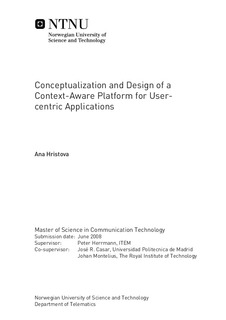Conceptualization and Design of a Context-Aware Platform for User-centric Applications
Master thesis
Permanent lenke
http://hdl.handle.net/11250/261964Utgivelsesdato
2008Metadata
Vis full innførselSamlinger
Sammendrag
With the appearance and expansion of mobile devices, ubiquitous computing is becoming more popular nowadays and the user and his tasks are becoming the focus of application development. One area of ubiquitous computing is composed by the context-aware systems, systems where applications are designed to react to the constant changes in the environment. The heterogeneity of the different domains where context is a key parameter has generated different approaches for context acquisition and modeling. Thus, a number of platforms have been developed in order to alleviate the process of application development and to set a common practice for building applications and services. This thesis studies the different platforms, focusing on the Context Toolkit. It examines the design principles, context representation, context acquiring methods and context handling. By developing services for a smart home, it explores the mechanisms applied in the framework and evaluates it. Furthermore, proposals for improving the Context Toolkit s functionality and the application s performance are given, by introducing the concept of quality of context and several enhancements regarding the resource discovery mechanism. Consequently, after gaining hands-on experience with developing a sample context-aware application and analyzing the Context Toolkit, a context-aware platform design is proposed which offers a complete solution defining all the necessary components and their interactions.
